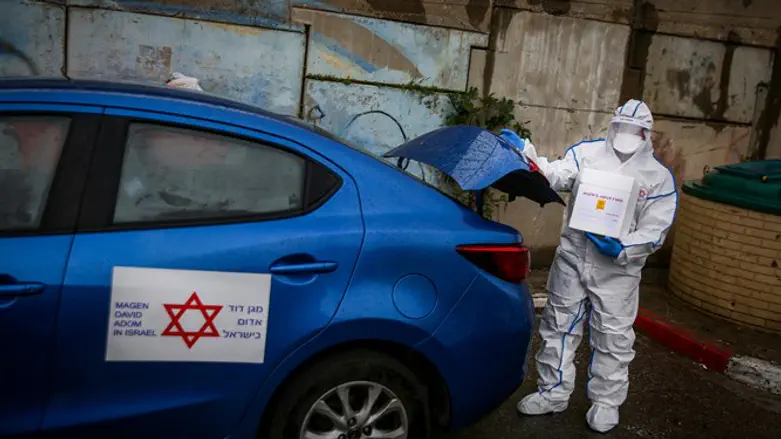
In late February, 11 Israeli citizens returned from an ill-fated cruise to Asia, presenting Israel with its first coronavirus cases.
Despite how little was known at the time about the disease's spread or how it could be contained, the country's national emergency medical service, Magen David Adom (MDA), was not at a loss about how to handle the introduction of this potentially fatal pathogen. In fact, unlike most of the world's EMS organizations, Magen David Adom had been routinely training for scenarios involving infectious diseases for decades. As a result, the organization has hundreds of paramedics among its ranks who already knew how to use personal protection gear to keep themselves safe and not inadvertently become a conduit for spreading the virus, and who knew how to isolate patients so they, too, wouldn't inadvertently infect others.
"Our whole mantra is that you can't train for a crisis once it's already started," says Guy Caspi, head of multi-casualty training for Magen David Adom. "By then, it's already too late."
With a culture of preparedness, MDA EMTs and paramedics train regularly for a wide variety of scenarios, from everything from earthquakes and train crashes to — this being the Middle East — terror attacks and enemy rocket fire.
And they regularly train for dealing with infectious diseases, although they admit that the likeliest scenario they previously envisioned there had little to do with a naturally occurring pandemic.
Situated in the Middle East, in the vicinity of enemy states and terrorist groups foresworn to Israel's destruction, Israelis liken their country's location to living in a dangerous neighborhood.
"Most of the time, when we've trained for biohazards, the scenarios we devised anticipated that some infectious disease would be deliberately spread," Caspi said. "But regardless, our medics aren't novices to the idea of staying safe — and keeping the general population safe — amid highly contagious diseases."
As part of its biohazard-training regimen, Magen David Adom also participates in Orange Flame Exercises, a series of drills led by the country's Ministry of Health, which include a number of Israeli agencies involved in addressing potential biological events, whether they're naturally occurring or the result of a terror attack.
"We routinely train with other official agencies that would be involved in a national crisis, such as the Ministry of Defense, the police, the Ministry of Health, and others," Caspi said. "This way, when a real crisis occurs, we already have established lines of communications and aren't just getting acquainted with the people we need to coordinate with for the very first time."
That emphasis on preparedness, combined with a healthy dose of paranoia about biological crises, may have provided MDA and Israel with an early jump on retarding the disease's spread during those potentially pivotal early days when the disease first appeared in Israel. Despite Israel's proximity to both Asia and Europe, and Israelis' appetite for travel, weeks into the current pandemic Israel has about 2,400 coronavirus cases in a country of over 9 million, a much lower infection rate than what most other countries are seeing. As of this writing, five elderly Israeli patients with underlying conditions have unfortunately succumbed to the disease.
While several Magen David Adom paramedics and EMTs have tested positive for coronavirus and are now in quarantine, none are believed to have contracted the virus from work-related contact.
"By quickly isolating patients returning from abroad and by having paramedics come to test patients in their homes, we were able to provide an important buffer to the hospitals and clinics and ensure that coronavirus patients weren't infecting other sick people as well as healthcare workers," said Dr. Refael Strugo, medical director for Magen David Adom.
MDA is currently moving to a program that will screen people for the disease in drive-through centers, using the patients' own vehicles to isolate them from other civilians while they travel. When it's fully rolled out in the next week, the program should increase Magen David Adom's daily testing capacity four-fold — to about 6,000 patients a day.
"Israel is still in the midst of this pandemic," Dr. Strugo concedes. "But by ensuring we didn't let the disease run unconstrained early on, it may provide us with a chance to truly keep the critical cases to a minimum and emerge from this crisis in far better shape than other countries."
"If this crisis ends relatively well for the Israeli people," Caspi says, "it will be the result in part because of how we handled things at the very beginning. And that to a large degree is what preparedness is all about."
